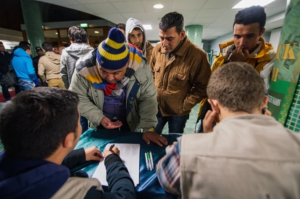Poor Mental Health / PTSD Coupled With UNHCR Interviews
After readi ng both the article on the treacherous journey as well as the article on hot spots within the EU, I thought they tied in really well with where we had left the class discussion this past Tuesday. We talked a lot about the interview portion of the asylum-seeking process and how the UNHCR employees who conduct these interviews, those in charge of determining if migrants are “worthy” of refugee-status, are some of the lowest positions within the UNHCR – employees without the proper training to talk to victims of trauma and PTSD. In the article on Hot Spots, Fassin described the process as “human triage with the aim of massive rejection” in which “applicants will have their fate decided by a fast-track process, making the provision of evidence for their claims difficult and ultimately diminishing their chances of being admitted.” Reading about the process of how they are forced to recount their stories in order to prove that they cannot return home, I began to look more into whether or not being forced to retell and therefore relive those events is especially triggering for those who are suffering from PTSD, and what the real mental consequences for these people are.
ng both the article on the treacherous journey as well as the article on hot spots within the EU, I thought they tied in really well with where we had left the class discussion this past Tuesday. We talked a lot about the interview portion of the asylum-seeking process and how the UNHCR employees who conduct these interviews, those in charge of determining if migrants are “worthy” of refugee-status, are some of the lowest positions within the UNHCR – employees without the proper training to talk to victims of trauma and PTSD. In the article on Hot Spots, Fassin described the process as “human triage with the aim of massive rejection” in which “applicants will have their fate decided by a fast-track process, making the provision of evidence for their claims difficult and ultimately diminishing their chances of being admitted.” Reading about the process of how they are forced to recount their stories in order to prove that they cannot return home, I began to look more into whether or not being forced to retell and therefore relive those events is especially triggering for those who are suffering from PTSD, and what the real mental consequences for these people are.
In an article (link above) I found written by clinical psychologist Emily Holmes entitled “Refugees Struggle with Mental Health Problems Caused by War and Upheaval,” Holmes described how the refugees that she talked to experienced on average, two flashbacks a day, which was startlingly higher than any of the other PTSD patients that she had been treating at the time.
Another article I found entitled “Trauma Post Trauma” was not actually about refugees but instead about US Veterans and talked about how the typical therapy for those returning from war with PTSD is a type of therapy known as “prolonged exposure.” Which, like it sounds, forces the recounting of trauma-inducing memories, which is supposed to make them less poignant over time but as this article is trying to emphasize, in many cases, makes many vets’ symptoms even worse. And while it was talking about a very different population, many of the traumatic war events that these vets endured are very similar to the scenes that most migrants and refugees have witnessed themselves especially those coming from places like the DRC, Syria, South Sudan etc. whose countries have been plagued with war.
Recent Comments